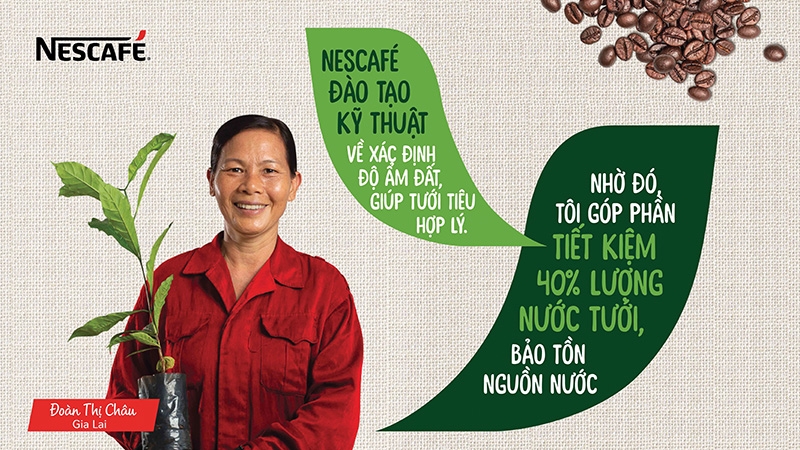Nestlé Vietnam’s programmes supporting sustainable actions
 |
| NESCAFÉ has launched a new package to highlight the efforts of farmers in preserving water resources while planting coffee |
William Mackereth, supply chain director of Nestlé Vietnam said that this year, the company has seen a 20 per cent pick-up in exports partly as the COVID-19 pandemic has driven coffee consumption by people forced to stay at home.
“If the export volume is maintained, we will invest in new facilities at our Tri An factory in Dong Nai province for further value-added capacity,” he explained.
As of present, Nestlé’s total investment in Vietnam has reached $700 million. In particular, all NESCAFÉ products are made from 100-per-cent responsibly-sourced quality Vietnamese coffee beans. Each year, Nestlé purchases 20-25 per cent of Vietnam’s coffee output for domestic consumption and export, injecting about $600-700 million into the rural economy.
The quality of NESCAFÉ products made in Vietnam is now widely accepted by consumers in 25 markets the world over, including the EU, Japan, and South Korea.
The EU-Vietnam Free Trade Agreement (EVFTA), which came into force in August, offers Nestlé Vietnam further opportunities to expand business here. The company makes brisk business in Europe with value-added processed coffee products. The EVFTA will facilitate export-import and offer tariff reductions or even exemptions when exporting to the EU, bringing even brighter prospects to Nestlé and its Vietnamese partners.
European markets have high requirements regarding quality and responsible sourcing, as well as the residual content of pesticides and herbicides.
The process Nestlé Vietnam has been implementing in the NESCAFÉ Plan already anticipates and addresses these constraints with spectacular success.
“We work through the Partnership for Sustainable Agriculture to expand collaboration with relevant stakeholders and partners to ensure farmers have the best access to training and the best practices to achieve the quality criteria the EU has set for Vietnamese coffee products,” said Mackereth. “Nestlé Vietnam is keen to increase its exports to the EU, which is one of the biggest recipients of our value-added coffee products.”
Among Nestlé Vietnam’s programmes launched to enhance the capacity of Vietnamese farmers, the NESCAFÉ Plan is one of the company’s most successful projects worldwide. Launched in Vietnam 10 years ago, the NESCAFÉ Plan has made significant contributions to the local coffee industry.
Starting from a team of 10 agronomists, the company has steadily increased activities every year. After a decade, the programme has supported 21,000 farmer households to achieve the internationally-recognised certificates. The programme also provided 260,000 training sessions on sustainable coffee cultivation techniques.
Furthermore, Nestlé Vietnam has also partnered up with the Western Highlands Agriculture and Forestry Science Institute (WASI) to grow and distribute 46 million plantlets. As a result, the programme helped coffee farmers save costs by reducing 40 per cent water for irrigation and 30 per cent chemical fertilisers and pesticides while increasing their incomes by 30-100 per cent.
Most recently, Nestlé Vietnam and WASI inaugurated their “NESCAFÉ WASI Coffee Farm Experience Center” in Buon Ma Thuot city in the Central Highlands province of Dak Lak.
The purpose of the Coffee Farm Experience Center is not only regaling consumers with inspiring stories about the hard work and pride of coffee farmers but also promoting Vietnamese coffee to all people inside and outside the country.
In addition, Nestlé has announced a roadmap to halve its absolute emissions by 2030 and also fulfil its net-zero goal by 2050 in order to promote sustainable development and climate change response.
In Vietnam, Nestlé is committed to long-term investment through responsible sourcing to improve the output, value, and quality of Vietnamese coffee in the global market.
What the stars mean:
★ Poor ★ ★ Promising ★★★ Good ★★★★ Very good ★★★★★ Exceptional
Related Contents
Latest News
More News
- EVN awards EPC contract for Quang Trach II LNG project (February 10, 2026 | 09:00)
- Canada backs Vietnam’s green transition with AGILE project (February 09, 2026 | 17:41)
- Momentum is real in the race to net-zero emissions (February 02, 2026 | 08:55)
- $100 million initiative launched to protect forests and boost rural incomes (January 30, 2026 | 15:18)
- Trung Nam-Sideros River consortium wins bid for LNG venture (January 30, 2026 | 11:16)
- Vietnam moves towards market-based fuel management with E10 rollout (January 30, 2026 | 11:10)
- Envision Energy, REE Group partner on 128MW wind projects (January 30, 2026 | 10:58)
- Vingroup consults on carbon credits for electric vehicle charging network (January 28, 2026 | 11:04)
- Bac Ai Pumped Storage Hydropower Plant to enter peak construction phase (January 27, 2026 | 08:00)
- ASEAN could scale up sustainable aviation fuel by 2050 (January 24, 2026 | 10:19)

 Tag:
Tag:




















 Mobile Version
Mobile Version